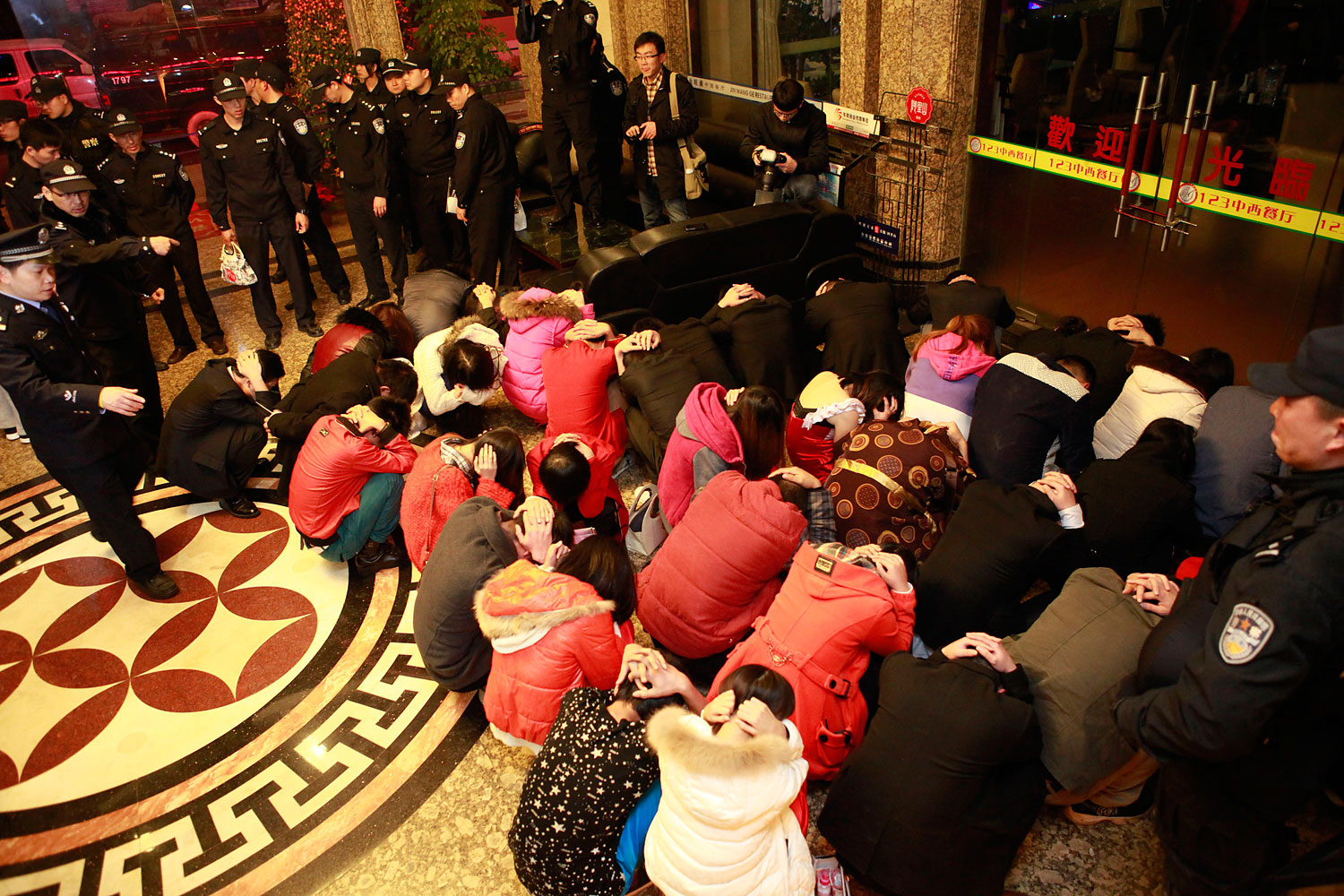
No paid sex, please. And while we’re at it, no gambling or drugs. That’s the message China’s government is sending as it launches a new, national struggle against the so-called three vices. State media are selling it as a matter of morality — a move that feels dangerously out of synch with facts on the ground.
The crackdown got under way more than a week ago after state broadcaster CCTV aired a segment on the prevalence of sex work in southern China’s “sin city,” Dongguan. The report showed women lining up for selection by customers and dancing in karaoke clubs — hardly unusual for the steamy manufacturing hub in Guangdong province. But just hours later, a 6,000-strong police force was sweeping the city. At least 67 people were arrested and two officials sacked.
(MORE: Vice Doesn’t Pay: 10 Scandalous Chinese Officials Who Landed With a Bump)
What seemed like a local operation now looks set to become a national crusade. Since the raids in Dongguan, several provinces have launched similar operations. On Sunday, the Ministry of Public Security officially urged other jurisdictions to follow Dongguan’s lead. “Be resolute with the crackdown, no matter who is involved, and regardless of what official ranks they are at, with no leniency or softheartedness,” it warned.
The language echoes the rhetoric of Xi Jinping’s anticorruption push. Since coming to power in late 2012, China’s top ruler has made fighting graft a public priority, vowing to target both “tigers” (top bureaucrats) and “flies” (rank-and-file civil servants). The effort has seen some high-level cadres caught red-handed — and has seriously hurt sales of luxury items, from pricey liquors to expensive wristwatches, favored by the ruling elite. The policy is far from perfect, but it is broadly popular.
The Dongguan dustup? Less so. Chinese netizens last week wondered why the state broadcaster needed hidden cameras to expose what is plainly visible on the street. Sex work is so commonplace in Dongguan’s hotels and spas that to “expose” it is absurd. And many expressed sympathy for the men and women — mostly women — caught up in the busts. A photograph of a candle with the phrase “Don’t Cry Dongguan” was widely circulated online. “Tonight, we are all Dongguaners,” others wrote.
Many seemed wary of a law-enforcement-led crackdown. Why send in local cops, people asked, when they no doubt played a role in the “protective umbrella” that kept the sex trade booming? Local police forces use fines levied on hotels, spa, saunas and karaoke parlors to bolster their bottom line, says Maya Wang, a Hong Kong–based researcher at Human Rights Watch. “Sex workers at the bottom of the business, who don’t have these relationships, will be the ones losing out,” Wang says.
(MORE: Communist Party Officials Gone Wild: Sex-Tape Scandal Rocks China)
Those arrested face a grim future in custody. Last year, a a 51-page Human Rights Watch report, Swept Away: Abuses Against Sex Workers in China, documented torture, beatings, physical assaults, arbitrary detentions and fines. Another report, by Asia Catalyst, a New York City–based NGO, chronicled systemic abuse in an extralegal system called “custody and education” that sees alleged prostitutes detained for up to two years without trial or recourse. “These types of crackdowns create an environment ripe for abuse,” Wang says.
High-profile antivice operations just push sex work underground, advocates say. When carrying condoms is grounds for arrest, sex workers are less likely to carry — or use — them. Men and women involved in the sex trade are also less likely to report violence or abuse if doing so puts them at risk of detention. “The most direct influence of the vice crackdown to them is they no longer have a steady job or they have to be more careful when working,” says Betty Shao, program officer at Zi Teng, a Hong Kong–based rights group that focuses on sex workers.
Ye Haiyan agrees. Ye is one of China’s best-known advocates for the rights of sex workers, abused children and people living with HIV/AIDS. In a bid to understand the sex trade, she once worked at a 10-yuan ($1.50) brothel and blogged about it. For this and other campaigns, she’s been detained and forcibly evicted by police. “Targeting sex workers who are already at the bottom of society is much easier than other targets,” she says. “The punishment for sex workers will be severe, but nothing will change.” Perhaps that’s why it’s unpopular.
— With reporting by Chengcheng Jiang / Beijing
MORE: In China, a Young Feminist Battles Sexual Violence Step by Step
More Must-Reads from TIME
- How Donald Trump Won
- The Best Inventions of 2024
- Why Sleep Is the Key to Living Longer
- Robert Zemeckis Just Wants to Move You
- How to Break 8 Toxic Communication Habits
- Nicola Coughlan Bet on Herself—And Won
- Why Vinegar Is So Good for You
- Meet TIME's Newest Class of Next Generation Leaders
Write to Emily Rauhala at emily_rauhala@timeasia.com